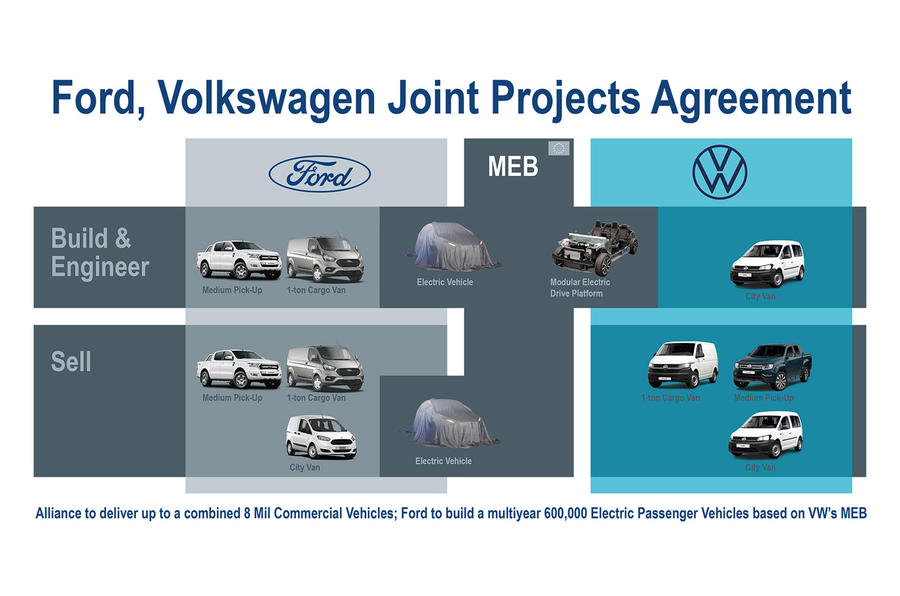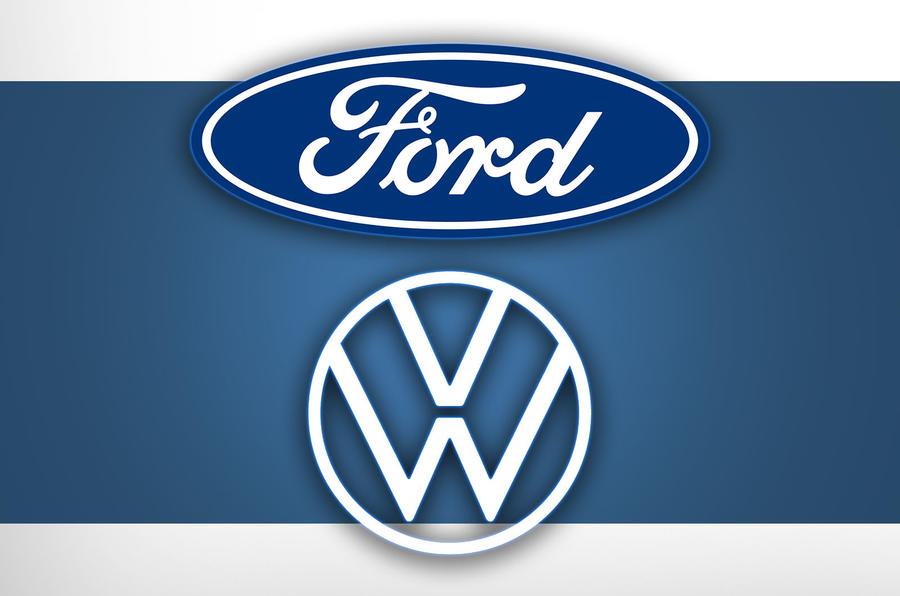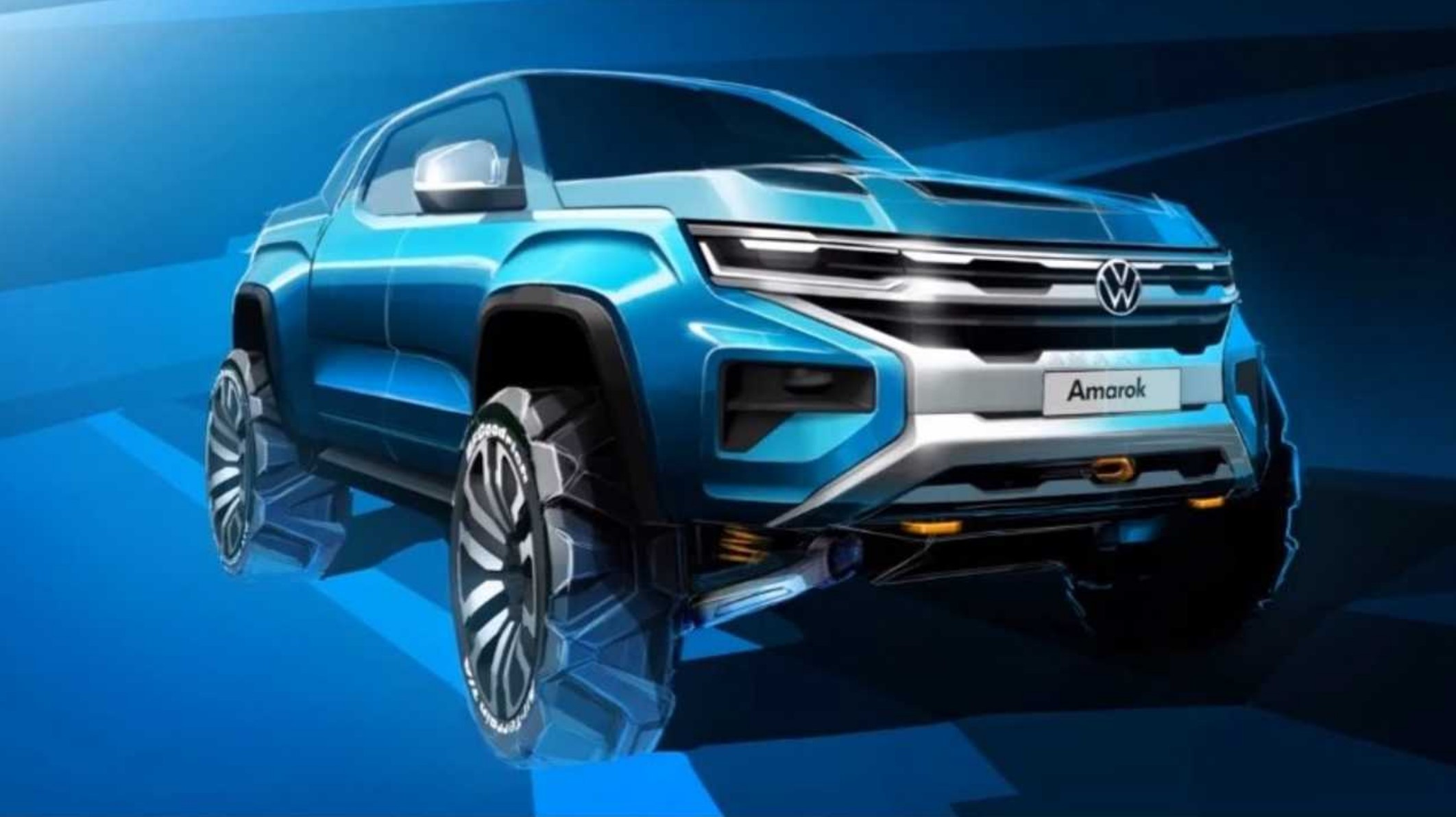Wide-ranging agreement will include new EV, next-gen Ford Ranger and VW Amarok, and two vans – with more set to follow.
Ford and Volkswagen bosses have finalised their wide-ranging global alliance, which will involve the two giants working together on electric cars, pick-up trucks, vans and autonomous technology.
The companies initially agreed to work together on commercial vehicle development in January 2019, with the plans expanded to involve pick-ups and a Ford EV built on the Volkswagen Group’s MEB platform last July. The two firms have now signed official agreements for the partnership and outlined full details of the projects that will be involved.
Volkswagen last week finalised a $3.8 billion investment in Argo AI, an American autonomous driving start-up company that Ford had already invested in.
In a joint release, Ford and Volkswagen said that their alliance will help them to “meet rapidly evolving needs of their respective customers in Europe and other regions by leveraging complementary strengths in mid-size pick-up trucks and commercial and electric vehicles”.

VW added that it’s new Amarok ute will arrive early 2022, with Ford’s new Ranger, based on the same platform, to come before it.
The alliance will offer substantial savings for both firms, allowing them to develop new or refreshed offerings in key market segments with substantially reduced development costs. Estimates suggest the combined savings of the agreement could reach $1.46 billion.
Volkswagen to provide platform for Ford EV
A key part of the agreement will be a Ford EV focused on the European market, due to arrive by 2023 and developed on the Volkswagen Group’s electric MEB architecture. The firms says that the Ford machine will be “highly differentiated” and designed and engineered at the American’s firm’s European base in Cologne, Germany.
While details of the machine are scarce, Ford says it will “add another compelling nameplate” that will sit alongside the electric Mustang Mach-E. Ford has recently begun a trend of reviving old names for new vehicles, choosing to give its first bespoke EV Mustang branding and recently badging its new compact crossover as the Puma. It’s also reviving the Bronco in America.
The two firms estimate that Ford “could deliver 600,000 electric vehicles atop the MEB architecture”, with Volkswagen saying the deal is “another cornerstone” in its EV strategy. While the MEB platform will underpin a range of EVs from Volkswagen, Seat, Skoda and Audi, it was also developed to enable it to be licensed to partner firms, helping the Volkswagen Group to achieve better economies of scale.
That volume could be key for Ford. While the Mustang Mach-E is due on sale in 2021, it has yet to announce further bespoke EV models, and the sale of the Volkswagen deal will likely prove key in meeting rising consumer demand and hitting its European Union CO2 targets.
As previously hinted at, the firms said that they “plan to explore additional ways to cooperate on electric vehicles.”

Ford and Volkswagen to team on vans and utes
The alliance between the firms will include the development of two commercial vans and a pick-up. The commercial vehicle segment is a key market for both firms in Europe but particularly Ford, with most of its profits in the region coming from it.
Ford will develop and build a new Volkswagen Amarok ute that will go on sale in 2022, and which will effectively be twinned with the Ford Ranger. Volkswagen has already teased the design of the new Amarok.
Ford will also develop and a new one-tonne cargo van for both firms, which will be the new version of the Ford Transit and Volkswagen Transporter respectively. Volkswagen’s Commercial Vehicles are will use its new Caddy as a basis to develop and build a new Ford Transit van.
The two firms expect to produce a total of around eight million of the three shared machines across their lifespans.
Argo AI to lead Ford and Volkswagen autonomy efforts
Volkswagen’s investment in Argo AI, completed last week, will lead to both Ford and Volkswagen working “to form distinct, highly capable autonomous-vehicle businesses based on Argo AI’s self-driving technology.”
The firms said they each “independently” chose to invest in Argo AI due to the “technical leadership” of the Pittsburgh-based firm’s autonomous technology and will use their combined scale to help the start-up expand its geographic testing reach.
James Attwood




